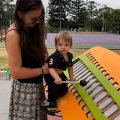Humanities researchers at the University of Queensland are on course to launch eight books in seven weeks, a record number of releases in such a short time.
Within the Faculty of Arts, both the Centre for Critical and Cultural Studies (CCCS) and the Centre for the History of European Discourses (CHED) are in the process of launching eight books covering an array of topics - from consumption in Cuba to the discovery of witchcraft.
CCCS Director Professor Graeme Turner said the level of publishing activity in such a short period of time was unprecedented at UQ.
“For two small centres to be generating such outcomes is exceptional by anyone’s standards,” he said.
“This burst of productivity demonstrates the important contributions of our staff to our strong research profile.”
Both centres are relatively small, with only eight Research Fellows in CCCS, and seven in CHED. These include a combination of senior research staff and early-career researchers.
On March 2, Director of the Centre for the History of European Discourses Professor Peter Harrison launched four books:
• England’s First Demonologist: Reginald Scot and 'The Discoverie of Witchcraft – by Professor Philip Almond
• Frigidity: An Intellectual History – by Professor Peter Cryle and Dr Alison Moore
• Writing History in Renaissance Italy: Leonardo Bruni and the uses of the past – by Dr Gary Ianziti
• Anatomy as spectacle: Public exhibitions of the body from 1700 to the present – by Dr Elizabeth Stephens.
On April 19, the CCCS will launch four additional books, including:
• Larrikins: A History – by Dr Melissa Bellanta
• Cuba: The Struggle for Consumption – by Dr Anna Cristina Pertierra
• Single Women in Popular Culture: The Limits of Postfeminism – by Dr Anthea Taylor
• What’s Become of Cultural Studies? – by Professor Graeme Turner.
Professor Turner says the CCCS launch shows the breadth of the interdisciplinary interests the centre has nurtured, including history, anthropology, feminist media studies, and cultural studies.
The CCCS launch will be held at 5.30pm on Thursday, April 19 at The UQ Co-op Bookshop, Building 4, Staff House Road, St Lucia Campus. For further details of the launch, contact admin.cccs@uq.edu.au
MEDIA: Dania Lawrence (07) 3365 9163 or d.lawrence@uq.edu.au). BACKGROUNDER
Written by Dr Melissa Bellanta, Larrikins: A History takes a trip through the street-based youth subculture known as larrikinism between 1870 and 1920.
In Cuba: The Struggle for Consumption, Dr Anna Cristina Pertierra suggests the key to understanding the nature of contemporary Cuba lies in studying the struggles of everyday consumption. Dr Pertierra warns that previous analyses of contemporary Cuba have overlooked the political and social importance of Cuban consumer culture in shaping identity.
Dr Anthea Taylor explores how, from Bridget Jones to Carrie Bradshaw, the ‘single woman’ has become more visible than ever before, prompting some commentators to suggest that she is now celebrated where once she was denigrated. Single Women in Popular Culture: The Limits of Postfeminism demonstrates how the single woman – despite appearing at times to be glamorised – continues to be a deeply problematic figure in popular culture.
What’s Become of Cultural Studies?, written by Professor Graeme Turner, offers a level-headed account of where cultural studies has come from, the methodological and theoretical dilemmas that it faces today, and an agenda for its future development. The book will be launched by Professor Elspeth Probyn.
England’s First Demonologist: Reginald Scot and 'The Discoverie of Witchcraft' is an in-depth study into the history of witchcraft in England. Professor Almond’s book significantly advances our knowledge of both witchcraft in early Modern England and the writer, Reginald Scot.
Frigidity: An Intellectual History is the first major study of the term in the history of sexuality. Professor Peter Cryle and Dr Alison Moore take the reader on a journey across four centuries, showing how notions of sexual coldness and frigidity have been thought about by legal, medical, psychiatric, psychoanalytic and literary writers. With a primary focus on France, the study ranges across seventeenth-century canon law, eighteenth and nineteenth-century medicine, nineteenth-century marital advice, literary works, and psychiatric theories; twentieth-century psychoanalysis, feminism and sexology.
In Writing History in Renaissance Italy: Leonardo Bruni and the uses of the past, Dr Gary Ianziti details the work of Leonardo Bruni: the most important humanist historian of the early Renaissance. Dr Gary Ianziti undertakes a systematic work-by-work investigation of the full range of Bruni’s output in history and biography, and assesses in detail the impact of the Greek historians on humanist methods of historical writing.
Anatomy as spectacle: Public exhibitions of the body from 1700 to the present, by Dr Elizabeth Stephens, shows how public exhibitions of the body have much to tell us about the history of popular culture and medicine. The book reconceptualises these displays as productive cultural spaces for the emergence of new ideas about bodily health.
.jpg)








